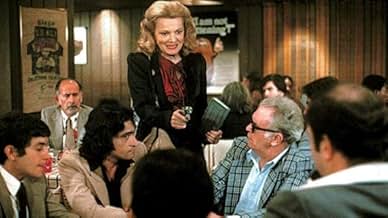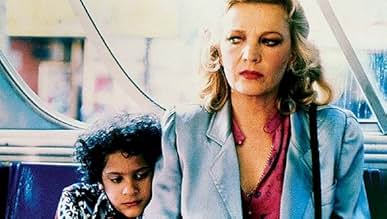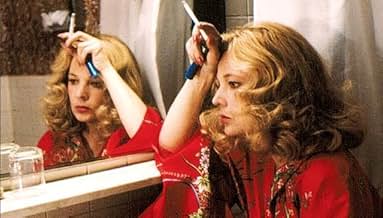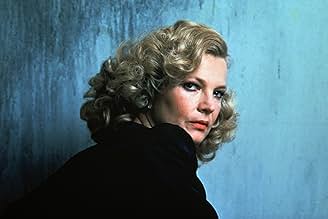CALIFICACIÓN DE IMDb
7.1/10
13 k
TU CALIFICACIÓN
Cuando la mafia mata a la familia de un niño, su vecina Gloria se convierte en su tutora reacia. En posesión de un libro que quieren los gánsteres, la pareja se da a la fuga en Nueva York.Cuando la mafia mata a la familia de un niño, su vecina Gloria se convierte en su tutora reacia. En posesión de un libro que quieren los gánsteres, la pareja se da a la fuga en Nueva York.Cuando la mafia mata a la familia de un niño, su vecina Gloria se convierte en su tutora reacia. En posesión de un libro que quieren los gánsteres, la pareja se da a la fuga en Nueva York.
- Dirección
- Guionista
- Elenco
- Nominado a 1 premio Óscar
- 4 premios ganados y 5 nominaciones en total
Gary Howard Klar
- Irish Cop
- (as Gary Klar)
- Dirección
- Guionista
- Todo el elenco y el equipo
- Producción, taquilla y más en IMDbPro
Opiniones destacadas
From its buildings, to its busy streets. From the people in the city, to the culture that created it, John Cassavetes perfectly captures the true essence of NYC. The true grit of the city, the core of the apple. The setting of the film is real. Unlike the remake almost twenty years later, NYC does not look like a commercial Disney Land without Mickey. Watching the film, you can smell the dirty hallways in the lower middle class hotels. You can hear the crowded Hispanic neighborhoods. And you can see what NYC is really like in Gloria.
I have not seen the remake of GLORIA yet, and needless to say, I'm not looking forward to it. Not to say that Sharon Stone can't play a tough female, who's self-imposed as a bodyguard for a kid running from mobsters. It is just that Gena Rowlands is so much more versatile, and her range so much wider, and I just KNOW that Stone won't be able to cut it. So, I will stop speculating, and get to the facts.
GLORIA is a film that Cassavete's made as an antidote to brainless, violent action films. All of the violence has dramatic purpose, and nothing is pointless here. This may be off-putting to fans of the action genre, but Cassavetes' contempt for the genre is what makes GLORIA more interesting. There are several unexpected twists.
When the film begins, Gloria is a street-smart woman who is kind of "married" to the mob. Gloria has a tomboyish quality that lends credibility to the fact that she has lived this long. She looks out for herself, first and foremost.
This changes when a weasel, and friend,of Gloria's (Buck Henry) is murdered by her mobster friends. Henry and his wife are killed, leaving behind a scared child. The little boy is a witness to the murder, and the mobsters make chase.
Gloria feels her maternal instincts begin to take over, and begrudgingly protects the boy. As the film progresses, however, she becomes more sincere in her protection, and she draws the line further for the mobsters. She has survived in the harsh city for this long, so it is easy to assume that she knows how to stay alive.
GLORIA is by no means Cassavete best film. There are long stretches that test your patience, that can sometimes seem static. But, as much as I dislike this quality, I am familiar with several Cassavetes' films, and understand what he is trying to achieve. Cassavetes is a very emotional director. He doesn't focus on tragedy; he is more interested in survival and the baggage that that brings. GLORIA is a thinking-person's thriller, and if you prefer big explosions and high body-counts, go and see DIE HARD 2 again. But, if you want to see something different, check this one out.
GLORIA is a film that Cassavete's made as an antidote to brainless, violent action films. All of the violence has dramatic purpose, and nothing is pointless here. This may be off-putting to fans of the action genre, but Cassavetes' contempt for the genre is what makes GLORIA more interesting. There are several unexpected twists.
When the film begins, Gloria is a street-smart woman who is kind of "married" to the mob. Gloria has a tomboyish quality that lends credibility to the fact that she has lived this long. She looks out for herself, first and foremost.
This changes when a weasel, and friend,of Gloria's (Buck Henry) is murdered by her mobster friends. Henry and his wife are killed, leaving behind a scared child. The little boy is a witness to the murder, and the mobsters make chase.
Gloria feels her maternal instincts begin to take over, and begrudgingly protects the boy. As the film progresses, however, she becomes more sincere in her protection, and she draws the line further for the mobsters. She has survived in the harsh city for this long, so it is easy to assume that she knows how to stay alive.
GLORIA is by no means Cassavete best film. There are long stretches that test your patience, that can sometimes seem static. But, as much as I dislike this quality, I am familiar with several Cassavetes' films, and understand what he is trying to achieve. Cassavetes is a very emotional director. He doesn't focus on tragedy; he is more interested in survival and the baggage that that brings. GLORIA is a thinking-person's thriller, and if you prefer big explosions and high body-counts, go and see DIE HARD 2 again. But, if you want to see something different, check this one out.
You start with flinty, streetsmart gangster types, cross their paths with a little kid, put them in urban peril, and then you squeeze how things stack up for sentimentality, suspense and humor. It's a charming idea, and perhaps that's why this could be considered John Cassavetes's most conventional film. It tells the story of a gangster's girlfriend who goes on the run with a young boy who is being pursued by the mob for information he doesn't even know he might have. But he wants to tell the story his own way, obstructing every convention we would normally expect, instilling a realist perspective in how we follow the movie, making the pay-off that much more worthwhile. Cassavetes didn't intend to direct his script. He just wanted to sell the story to Columbia Pictures. But once his wife Gena Rowlands was asked to play Gloria, she obliged Cassavetes to direct it.
This underdog crime drama is particularly absorbing in its first hour, and ignites with a great beginning. We follow one character, it leads to another character, perspectives are interknit, the situation builds and Cassavetes has complete control over what we know and expect, all in spite of the all-too-familiar premise, which is then set for the rest of the movie, which is a cat-and-mouse hunt per the seedier locales of New York and New Jersey. He makes the threat so real that when the two key characters evade tangible danger, we still feel the tension whenever they round a corner, get in and out of cabs, and other such ordinary actions. He doesn't let on that unwanted company is present. It just happens. There is one scene that lasts for quite awhile before we realize, after Rowlands's title character does, that unwanted company has been there the entire time.
In an Oscar-nominated performance, Rowlands is expectedly the beautiful lead actress, but she sports a kind of masculine quality, creating a much more dense dynamic when she, afraid of her maternal instincts, finds them overpowering her lifelong self-preservation, and begrudgingly protects the boy. As the film progresses, however, she becomes more sincere in her protection, and integrates her love with her seasoned familiarity with how to stay alive in this town. In one creative take on the Fine, I Don't Need You Anyway scene, she asks a bartender, "There's reasons I can't turn and just look, but is there a little kid headed in here or across the street or whatever?" She drives her role with such honest irritable liveliness. Yet the kid is also well cast. He was a conspicuous little boy named John Adames with dark hair, big eyes and a way of trucking his dialogue as if confronting you to adjust a single word. It all works because everything about his character, the way he dresses, talks, revolts and moves, serves the naive notion that he is older, smarter and cooler than he is.
Cassavetes has a natural keenness for guilelessly unadorned location shooting in that he never plans, stages, waits on the weather or time of day, or hires extras or stunt drivers. Note how passers-by in the distance will often look on at the characters, whether Gloria has pulled a gun in a public place or not. Wherever the characters need to be, that place is in real time, as dirty, scuzzy and purely of the film's era as it would've normally been. There's a shabby flophouse where the clerk tells Gloria, "Just pick a room. They're all open." There are bus stations, back alleys, dimly lit hallways, and bars that open at dawn. And his occasional action scenes are so thrilling because of their surprise.
For once, Cassavetes doesn't stage indefinitely extensive scenes of dialogue wherein the actors indulge in their own view of their characters' unraveling. But I miss that. As I've already said, I am very impressed with how tightly he mounts suspense from the very beginning, how Gloria and the kid zip from cab to bus to cab to street to hotel to cab and so on. But regardless of how doggedly realistic he is in his portrayal of a recycled movie plot, he still relies upon that plot rather than the impositions of his characters flexing their wings.
This underdog crime drama is particularly absorbing in its first hour, and ignites with a great beginning. We follow one character, it leads to another character, perspectives are interknit, the situation builds and Cassavetes has complete control over what we know and expect, all in spite of the all-too-familiar premise, which is then set for the rest of the movie, which is a cat-and-mouse hunt per the seedier locales of New York and New Jersey. He makes the threat so real that when the two key characters evade tangible danger, we still feel the tension whenever they round a corner, get in and out of cabs, and other such ordinary actions. He doesn't let on that unwanted company is present. It just happens. There is one scene that lasts for quite awhile before we realize, after Rowlands's title character does, that unwanted company has been there the entire time.
In an Oscar-nominated performance, Rowlands is expectedly the beautiful lead actress, but she sports a kind of masculine quality, creating a much more dense dynamic when she, afraid of her maternal instincts, finds them overpowering her lifelong self-preservation, and begrudgingly protects the boy. As the film progresses, however, she becomes more sincere in her protection, and integrates her love with her seasoned familiarity with how to stay alive in this town. In one creative take on the Fine, I Don't Need You Anyway scene, she asks a bartender, "There's reasons I can't turn and just look, but is there a little kid headed in here or across the street or whatever?" She drives her role with such honest irritable liveliness. Yet the kid is also well cast. He was a conspicuous little boy named John Adames with dark hair, big eyes and a way of trucking his dialogue as if confronting you to adjust a single word. It all works because everything about his character, the way he dresses, talks, revolts and moves, serves the naive notion that he is older, smarter and cooler than he is.
Cassavetes has a natural keenness for guilelessly unadorned location shooting in that he never plans, stages, waits on the weather or time of day, or hires extras or stunt drivers. Note how passers-by in the distance will often look on at the characters, whether Gloria has pulled a gun in a public place or not. Wherever the characters need to be, that place is in real time, as dirty, scuzzy and purely of the film's era as it would've normally been. There's a shabby flophouse where the clerk tells Gloria, "Just pick a room. They're all open." There are bus stations, back alleys, dimly lit hallways, and bars that open at dawn. And his occasional action scenes are so thrilling because of their surprise.
For once, Cassavetes doesn't stage indefinitely extensive scenes of dialogue wherein the actors indulge in their own view of their characters' unraveling. But I miss that. As I've already said, I am very impressed with how tightly he mounts suspense from the very beginning, how Gloria and the kid zip from cab to bus to cab to street to hotel to cab and so on. But regardless of how doggedly realistic he is in his portrayal of a recycled movie plot, he still relies upon that plot rather than the impositions of his characters flexing their wings.
Tastes may vary on this one, but there's much about this film that's endearing to viewers. It strikes you that the story isn't exactly the only of its kind (I see it as a precursor to -Leon- and probably takes cues from the delightful -Paper Moon-, but others of its "kind" are hard to think of), but it's about as well-done as you might expect. Some may not care for the Cassavetes stylistic touches, but here they are not especially intrusive. Gloria's a tough and likeable "bitch" with a moral compass, rightfully the center of the story. It outdoes -Leon- by not investing too much script capital in "developing" the child character. (It was primarily that aspect of -Leon- that annoyed me most.) This is straightforward, without the frills and gimmicks, emotional or otherwise. I do plan on watching the recent version with Sharon Stone, but don't expect to be as satisfied as with this.
I'd give it a minimum of 7/10 on my own, tough scale. I am surprised this is so little-known compared to -Leon-.
I'd give it a minimum of 7/10 on my own, tough scale. I am surprised this is so little-known compared to -Leon-.
This is one of my favorite movies of all times. Gena Rowlands is a powerhouse actor in this gutsy film about survival, courage and compassion set in the fast-paced, gritty New York City of the 70s. The acting all-around is exceptional. The film is riveting from beginning to end. You get swept up in Gloria's dilemma right away. The scene where she has to decide whether to save herself and turn the kid over to his assassins is very believable as you can see and feel how desperate one would be in such a dire situation. Another great scene is at a Penn Station coffee shop where she confronts the stalking mobsters at a nearby table. You can hear a pin drop in that restaurant as she stands there saying, "I'm Gloria. My hand is on my gun in my purse!" Yet another great scene is the crowded subway where she literally throws punches with one of the mobsters who has caught up with her. Everyone in that graffiti-laden subway car presses against the walls trying to get away when Gloria pulls her gun. She says as she gets off: "Ya punk! Ya Punk. Ya let a sissy beat you, huh? You punk! Go ahead, punk!." Then the subway car closes and she and the kid get away yet again. So, get lots of popcorn, turn off the phones and curl up in bed with the lights off for this one!
¿Sabías que…?
- TriviaActress Gena Rowlands once said of her ex-gun moll character: "When I read the script, I knew I wanted a walk for her. I wanted something that, from the minute you saw me, you knew I could handle myself on the streets of New York. So I started thinking about when I lived in New York, how different I walked down the street when there was nobody but me. It was a walk that said, they'd better watch out."
- ErroresWhen Phil boards the train, the shot has been reversed, as evidenced by backwards lettering on the signs on the train and the platform.
Selecciones populares
Inicia sesión para calificar y agrega a la lista de videos para obtener recomendaciones personalizadas
- How long is Gloria?Con tecnología de Alexa
Detalles
- Fecha de lanzamiento
- País de origen
- Sitios oficiales
- Idiomas
- También se conoce como
- One Summer Night
- Locaciones de filmación
- Trinity Church Cemetery - 770 Riverside Drive, Manhattan, Nueva York, Nueva York, Estados Unidos(ending scene at Pittsburgh cemetery)
- Productora
- Ver más créditos de la compañía en IMDbPro
Taquilla
- Total en EE. UU. y Canadá
- USD 4,059,673
- Fin de semana de estreno en EE. UU. y Canadá
- USD 33,767
- 5 oct 1980
- Total a nivel mundial
- USD 4,062,212
Contribuir a esta página
Sugiere una edición o agrega el contenido que falta































